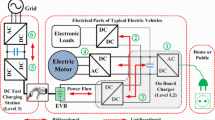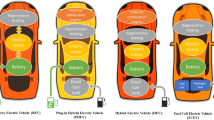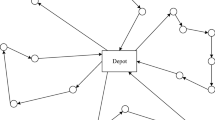Abstract
In hybrid electric vehicles, the electrical powertrain system has multiple energy sources that it can gather power from to satisfy the propulsion power requested by the vehicle at each instant. This paper focusses on the minimization of the fuel consumption of such a vehicle, taking advantage of the different energy sources. Based on global optimization approaches, the proposed heuristics find solutions that best split the power requested between the multi-electrical sources available. A lower bounding procedure is introduced to validate the quality of the solutions. Computational results show a significant improvement over previous results from the literature in both the computing time and the quality of the solutions.











Similar content being viewed by others
References
Bernard J, Delprat S, Guerra TM, Büchi FN (2010) Fuel efficient power management strategy for fuel cell hybrid powertrains. Control Eng Pract 18:408–417
Bertsekas DP (2011) Dynamic programming and optimal control, vol II, chap 6. In: Approximate dynamic programming, 3rd edn. Nashua: ISBN 1-886529-26-4, Massachusetts Institute of Technology, pp 322–552
Bolvashenkov I, Herzog H-G, Engstle A (2006) Factor of hybridization as a design parameter for hybrid vehicles. In: International symposium on power electronics, electrical drives, automation and motion (SPEEDAM), IEEE, pp 926–929
Bosman MGC, Bakker V, Molderink A, Hurink JL, Smit GJM (2012) Planning the production of a fleet of domestic combined heat and power generators. Eur J Oper Res 216:140–151
Brahma A, Guezennec Y, Rizzoni G (2000) Optimal energy management in series hybrid electric vehicles. In: American control conference (ACC) 1(6): 60–64, IEEE
Buecherl D, Bolvashenkov I, Herzog H (2009) Verification of the optimum hybridization factor as design parameter of hybrid electric vehicles. In: IEEE vehicle power and propulsion conference (VPPC), IEEE, pp 847–851
Burke AF (2007) Batteries and ultracapacitors for electric, hybrid, and fuel cell vehicles. Proc IEEE 95:806–820
Chan CC (2007) The state of the art of electric, hybrid, and fuel cell vehicles. Proc IEEE 95:704–718
Feo TA, Resende MGC (1995) Greedy randomized adaptive search procedures. J Global Optim 6:109–133
Gao J, Sun F, He H, Zhu GG, Strangas EG (2009) A comparative study of supervisory control strategies for a series hybrid electric vehicle. In: Asia-Pacific power and energy engineering conference (APPEEC), IEEE, pp 1–7
Gaoua Y, Caux S, Lopez P (2013) A combinatorial optimization approach for the electrical energy management in a multi-source system. In: 2nd international conference on operations research and enterprise systems (ICORES 2013), SciTePress, pp 55–59
Hankache W (2008) Gestion Optimisée de l’énergie électrique d’un Groupe Electrogène Hybride à Pile à Combustible. PhD thesis, Institut National Polytechnique de Toulouse
He Y, Chowdhury M, Pisu P, Ma Y (2012) An energy optimization strategy for power-split drivetrain plug-in hybrid electric vehicles. Transp Res Part C: Emerg Technol 22:29–41
Hofman T, Steinbuch M, Van Druten R, Serrarens A (2007) Rule-based energy management strategies for hybrid vehicles. Int J Electr Hybrid Veh 1:71–94
Horst R, Tuy H (2000) Global Optimization: Deterministic Approaches, 3rd edn, ISBN 9783540610380, Springer, p 728
Jacomino M, Le M (2012) Robust energy planning in buildings with energy and comfort costs. Q J Oper Res (4OR) 10:81–103
Jalil N, Kheir NA, Salman M (1997) A rule-based energy management strategy for a series hybrid vehicle. In: American control conference (ACC), IEEE, pp 689–693
Kim N, Cha S, Peng H (2011) Optimal control of hybrid electric vehicles based on Pontryagin’s minimum principle. IEEE Trans Control Syst Technol 19:1279–1287
Lukic SM, Emadi A (2004) Effects of drivetrain hybridization on fuel economy and dynamic performance of parallel hybrid electric vehicles. IEEE Trans Veh Technol 53:385–389
Mathworks (2013) http://www.mathworks.fr/help/toolbox/optim/ug/fmincon.html. Accessed 27 March 2013
Neffati A, Caux S, Fadel M (2012) Fuzzy switching of fuzzy rules for energy management in HEVs. In: 8th power plant and power system control symposium (PP&PSC), pp 663–668
Ngo DV, Hofman T, Steinbuch M, Serrarens AFA (2010) An optimal control-based algorithm for hybrid electric vehicle using preview route information. In: American control conference (ACC). IEEE, pp 5818–5823
Paganelli G, Delprat S, Guerra T-M, Rimaux J, Santin JJ (2002) Equivalent consumption minimization strategy for parallel hybrid powertrains. In: IEEE 55th vehicular technology conference (VTC). IEEE 4: 2076–2081
Pérez L, García GO (2010) State constrained optimal control applied to supervisory control in HEVs, oil & gas science and technology. Revue de l’Institut Français du Pétrole 65:191–201
Pérez LV, Bossio GR, Moitre D, García GO (2006) Optimization of power management in an hybrid electric vehicle using dynamic programming. Math Comput Simul 73:244–254
Pérez LV, Pilotta EA (2009) Optimal power split in a hybrid electric vehicle using direct transcription of an optimal control problem. Math Comput Simul 79:1959–1970
Pisu P, Rizzoni G (2007) A comparative study of supervisory control strategies for hybrid electric vehicles. IEEE Trans Control Syst Technol 15:506–518
Shen C, Shan P, Gao T (2011) A comprehensive overview of hybrid electric vehicles. Int J Veh Technol 2011:7
Vis IFA (2006) Survey of research in the design and control of automated guided vehicle systems. Eur J Oper Res 170:677–709
Yu Y-B, Wang Q-N, Min H-T, Wang P-Y, Hao C-G (2009) Control strategy optimization using dynamic programming method for synergic electric system on hybrid electric vehicle. Nat Sci 1:222–228
Zadeh L (1965) Fuzzy sets. Inf Control 8:338–353
Author information
Authors and Affiliations
Corresponding author
Ethics declarations
Conflict of interest
The authors declare that they have no conflict of interest.
Rights and permissions
About this article
Cite this article
Ngueveu, S.U., Caux, S., Messine, F. et al. Heuristics and lower bounds for minimizing fuel consumption in hybrid-electrical vehicles. 4OR-Q J Oper Res 15, 407–430 (2017). https://doi.org/10.1007/s10288-017-0343-5
Received:
Revised:
Published:
Issue Date:
DOI: https://doi.org/10.1007/s10288-017-0343-5




